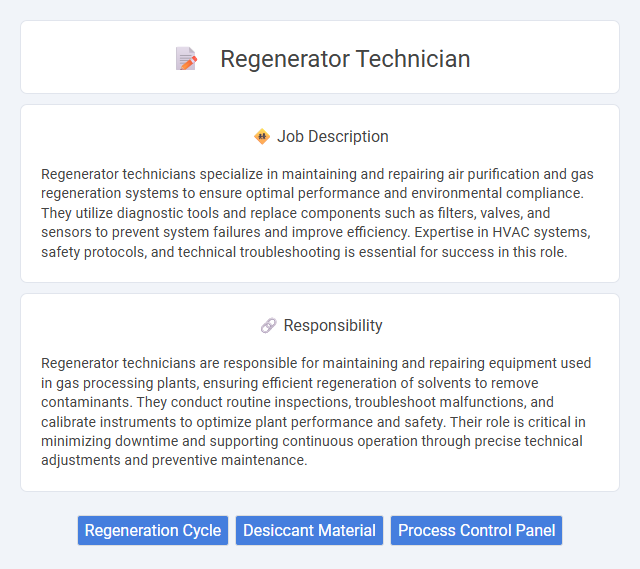
Regenerator technicians specialize in maintaining and repairing air purification and gas regeneration systems to ensure optimal performance and environmental compliance. They utilize diagnostic tools and replace components such as filters, valves, and sensors to prevent system failures and improve efficiency. Expertise in HVAC systems, safety protocols, and technical troubleshooting is essential for success in this role.
Individuals with strong problem-solving skills and mechanical aptitude are likely suitable for a regenerator technician role, as the job often requires diagnosing and repairing complex machinery. Candidates who can work under pressure and handle physically demanding tasks may have a higher probability of success. Those with limited technical knowledge or difficulty with hands-on work might find the responsibilities challenging.
Qualification
Regenerator technicians require a strong background in mechanical or electrical engineering, often demonstrated by an associate degree or relevant technical certifications. Proficiency in operating, maintaining, and troubleshooting gas and air regeneration systems is essential for optimal performance and safety. Hands-on experience with industrial machinery and adherence to safety regulations are critical qualifications for success in this role.
Responsibility
Regenerator technicians are responsible for maintaining and repairing equipment used in gas processing plants, ensuring efficient regeneration of solvents to remove contaminants. They conduct routine inspections, troubleshoot malfunctions, and calibrate instruments to optimize plant performance and safety. Their role is critical in minimizing downtime and supporting continuous operation through precise technical adjustments and preventive maintenance.
Benefit
A Regenerator Technician likely offers significant benefits such as competitive salary and comprehensive health insurance, which may promote financial stability and well-being. Opportunities for professional development and skill enhancement could be common, increasing career growth potential. Employee benefits might also include retirement plans and paid time off, contributing to overall job satisfaction and work-life balance.
Challenge
Regenerator technician roles likely involve complex troubleshooting and maintaining advanced machinery, presenting ongoing technical challenges that require critical thinking and precision. The probability of encountering unexpected mechanical failures may necessitate rapid problem-solving and adaptability. Continuous advancements in technology could demand regular skill updates to effectively manage and optimize regenerator systems.
Career Advancement
Regenerator technicians specialize in maintaining and repairing systems that restore chemical or mechanical functions in various industries, offering a clear pathway to advanced roles such as senior technician, maintenance supervisor, or operations manager. Gaining certifications in industrial maintenance, automation, and safety protocols enhances career progression and opens opportunities in larger facilities or specialized sectors like pharmaceuticals and petrochemicals. Continuous skill development and expertise in regenerative technologies position technicians for leadership roles and increased salary prospects within the industrial maintenance field.
Key Terms
Regeneration Cycle
A Regenerator Technician specializes in maintaining and optimizing regeneration cycles within industrial systems, ensuring efficient removal of contaminants from adsorbent materials. Mastery of the regeneration cycle is crucial for maximizing equipment lifespan and maintaining operational performance by controlling temperature, pressure, and timing parameters. Skilled technicians analyze cycle data to detect deviations and implement corrective actions that enhance system reliability and energy efficiency.
Desiccant Material
Regenerator technicians specializing in desiccant material operate and maintain systems that restore moisture-absorbing substances used in industrial drying processes, ensuring optimal performance and longevity. They monitor humidity levels, replace or recharge desiccant beads, and troubleshoot equipment to prevent moisture contamination that can affect product quality and system efficiency. Their expertise in handling silica gel, activated alumina, and molecular sieves directly impacts the reliability of compressed air and gas dehydration systems.
Process Control Panel
Regenerator technicians expertly manage the Process Control Panel to monitor and adjust critical operating parameters in gas processing and petrochemical plants. They ensure optimal regenerator performance by analyzing sensors and control signals related to temperature, pressure, and flow rates, enabling efficient removal of impurities. Proficiency with Programmable Logic Controllers (PLCs) and Human-Machine Interfaces (HMIs) is essential for troubleshooting and maintaining uninterrupted system operations.
 kuljobs.com
kuljobs.com